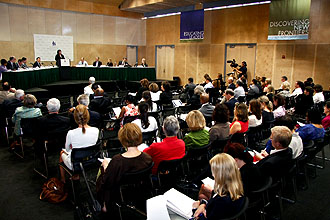Campus Hearing Addresses "No Child Left Behind"
Educational heavy-hitters were on campus for a public hearing on Monday (April 5) to discuss proposed changes to the Elementary and Secondary Education Act. The Aspen Institute hosted the hearing in which members of the No Child Left Behind Commission heard testimony from experts on the law enacted by the Bush administration.

The Aspen Institute holds a public hearing on proposed changes to No Child Left Behind on the Tulane uptown campus. (Photo by Guillermo Cabrera-Rojo)
Although the No Child Left Behind Act, the current reauthorization of the Education and Secondary Education Act, received strong bipartisan support when it sailed through Congress in 2001, it has taken heat from critics who claim it incentivizes lax standardized testing and holds back gifted and high-performing students while focusing on underperforming students.
One major theme of the hearing was accountability and what to do when an individual school or school district is failing. The Obama administration is considering the idea of removing the punitive aspect of No Child Left Behind, advocating more of the proverbial carrot than the stick.
Louisiana Superintendent of Education Paul Pastorek, who serves on the commission, touted the system being used in New Orleans that puts control of the schools in the hands of the principals, thus addressing questions of accountability.
"The basic concept of our operations is that when a principal runs a school building, creativity and innovation can grow within that school building," Pastorek said.
Paul Vallas, head of the state's Recovery School District, argued that students in the United States will continue to lag behind other nations due to the fact that they are spending less time in the classroom.
"You wonder why our students are underperforming on math and science? Because we're not spending enough time on math and science; our school day and school year are too short," Vallas said. "When you're only spending one hour a day on math instead of two, and you're in school 150 to 160 days instead of 210 or 220 ⦠we're going to be at a disadvantage."
